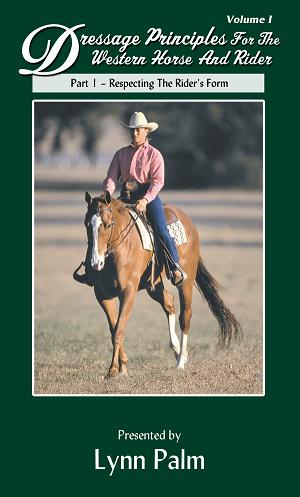
Dressage Principles Volume I - Part 1
Price $39.95- More Details
- Other items you might want to order:
Dressage Principles Volume I - Part 1 More Details
Part 1: Respecting the Rider's Proper Form
Why is the rider's form so essential to build a rider's skills? Because of
relaxation and balance. A rider's position is not a molded form, set rigidly on
a horse for the purpose of looking pretty. The rider must position his body in
order to follow at all times, and without interference, the horse's every
movement and reaction. Through the proper form, the rider can achieve a state of
balance that will allow him to feel relaxed and in command of his body, and not
interfere with the horse's balance and his responses to the rider. As you
practice seriously to condition your body, and utilize exercises to become more
supple and flexible, your form becomes centered, balanced, and relaxed. Most
importantly, you can coordinate your body parts and mind independently. This is
the first step in building articulate communication and willing responses from
your horse.
DRESSAGE means training of the horse and of the rider to unite as one. It does
not matter what type of saddle you use, or what breed of horse you train. If
your challenge is to ride for exercise and fitness, ride for pleasure, for the
discipline of the sport, or as a serious competitor, RESPECTING THE RIDER'S FORM
is the same in any discipline. This Part 1 DVD shows you a series of exercises
for every part of your body. These exercises result in your understanding of
"Form to Function", making you an effective rider which leads to bringing out
the best in your horse.
Time: 60 Minutes
LYNN RECOMMENDS: This series is recommended for all riders regardless of skill
level or riding interest. Part 1 will assist the beginning rider in finding his
balance or the more advanced rider in achieving perfect balance. Part 2 will
hone the rider’s aids communication including the use of the seat, leg and rein
aids. With the proper use of the natural aids, the horse will respond with
lightness, acceptance and confidence. Parts 3, 4 and 5 apply to training a young
horse under saddle or retraining an older horse to respond with more confidence
and control. Part 3 is a great introduction to taking proper leads and the
canter itself. Part 4 is great to improve transitions and speed control in all
three gaits. Part 5 will begin and advance collection with lateral training,
counter canter and simple and flying lead changes. Dressage Principles for the
Western Horse and Rider demonstrates the epitome of Palm Partnership
Training—using Dressage Principles for all breeds of horses and all levels of
riders.





